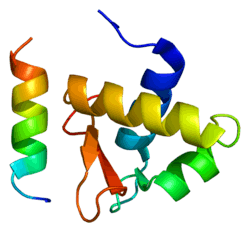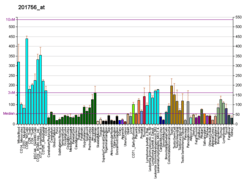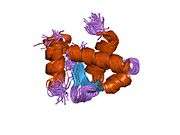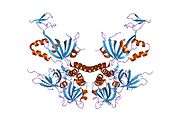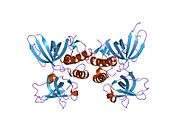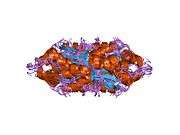Replication protein A2
Replication protein A 32 kDa subunit is a protein that in humans is encoded by the RPA2 gene.[5][6]
Interactions
RPA2 has been shown to interact with:
gollark: But there will be no buffering of DMs, so if you get one when not connected it'll just implode.
gollark: Actually, it might?
gollark: It won't work very well, though.
gollark: I think that's possible, yes.
gollark: While I appreciate your committent to overly general features, this was bad.
See also
References
- GRCh38: Ensembl release 89: ENSG00000117748 - Ensembl, May 2017
- GRCm38: Ensembl release 89: ENSMUSG00000028884 - Ensembl, May 2017
- "Human PubMed Reference:". National Center for Biotechnology Information, U.S. National Library of Medicine.
- "Mouse PubMed Reference:". National Center for Biotechnology Information, U.S. National Library of Medicine.
- Umbricht CB, Erdile LF, Jabs EW, Kelly TJ (Mar 1993). "Cloning, overexpression, and genomic mapping of the 14-kDa subunit of human replication protein A". The Journal of Biological Chemistry. 268 (9): 6131–8. PMID 8454588.
- "Entrez Gene: RPA2 Replication protein A2, 32kDa".
- Otterlei M, Warbrick E, Nagelhus TA, Haug T, Slupphaug G, Akbari M, Aas PA, Steinsbekk K, Bakke O, Krokan HE (Jul 1999). "Post-replicative base excision repair in replication foci". The EMBO Journal. 18 (13): 3834–44. doi:10.1093/emboj/18.13.3834. PMC 1171460. PMID 10393198.
- Shao RG, Cao CX, Zhang H, Kohn KW, Wold MS, Pommier Y (Mar 1999). "Replication-mediated DNA damage by camptothecin induces phosphorylation of RPA by DNA-dependent protein kinase and dissociates RPA:DNA-PK complexes". The EMBO Journal. 18 (5): 1397–406. doi:10.1093/emboj/18.5.1397. PMC 1171229. PMID 10064605.
- Sukhodolets KE, Hickman AB, Agarwal SK, Sukhodolets MV, Obungu VH, Novotny EA, Crabtree JS, Chandrasekharappa SC, Collins FS, Spiegel AM, Burns AL, Marx SJ (Jan 2003). "The 32-kilodalton subunit of replication protein A interacts with menin, the product of the MEN1 tumor suppressor gene". Molecular and Cellular Biology. 23 (2): 493–509. doi:10.1128/mcb.23.2.493-509.2003. PMC 151531. PMID 12509449.
- Bochkareva E, Korolev S, Lees-Miller SP, Bochkarev A (Apr 2002). "Structure of the RPA trimerization core and its role in the multistep DNA-binding mechanism of RPA". The EMBO Journal. 21 (7): 1855–63. doi:10.1093/emboj/21.7.1855. PMC 125950. PMID 11927569.
- Bochkareva E, Frappier L, Edwards AM, Bochkarev A (Feb 1998). "The RPA32 subunit of human replication protein A contains a single-stranded DNA-binding domain". The Journal of Biological Chemistry. 273 (7): 3932–6. doi:10.1074/jbc.273.7.3932. PMID 9461578.
- Kim J, Kim D, Chung J (2000). "Replication protein a 32 kDa subunit (RPA p32) binds the SH2 domain of STAT3 and regulates its transcriptional activity". Cell Biology International. 24 (7): 467–73. doi:10.1006/cbir.2000.0525. PMID 10875894.
- Yoo E, Kim BU, Lee SY, Cho CH, Chung JH, Lee CH (Aug 2005). "53BP1 is associated with replication protein A and is required for RPA2 hyperphosphorylation following DNA damage". Oncogene. 24 (35): 5423–30. doi:10.1038/sj.onc.1208710. PMID 15856006.
- Nagelhus TA, Haug T, Singh KK, Keshav KF, Skorpen F, Otterlei M, Bharati S, Lindmo T, Benichou S, Benarous R, Krokan HE (Mar 1997). "A sequence in the N-terminal region of human uracil-DNA glycosylase with homology to XPA interacts with the C-terminal part of the 34-kDa subunit of replication protein A". The Journal of Biological Chemistry. 272 (10): 6561–6. doi:10.1074/jbc.272.10.6561. PMID 9045683.
Further reading
- Dutta A, Stillman B (Jun 1992). "cdc2 family kinases phosphorylate a human cell DNA replication factor, RPA, and activate DNA replication". The EMBO Journal. 11 (6): 2189–99. doi:10.1002/j.1460-2075.1992.tb05278.x. PMC 556686. PMID 1318195.
- Erdile LF, Wold MS, Kelly TJ (Feb 1990). "The primary structure of the 32-kDa subunit of human replication protein A". The Journal of Biological Chemistry. 265 (6): 3177–82. PMID 2406247.
- Li L, Lu X, Peterson CA, Legerski RJ (Oct 1995). "An interaction between the DNA repair factor XPA and replication protein A appears essential for nucleotide excision repair". Molecular and Cellular Biology. 15 (10): 5396–402. doi:10.1128/mcb.15.10.5396. PMC 230789. PMID 7565690.
- Umbricht CB, Griffin CA, Hawkins AL, Grzeschik KH, O'Connell P, Leach R, Green ED, Kelly TJ (Mar 1994). "High-resolution genomic mapping of the three human replication protein A genes (RPA1, RPA2, and RPA3)". Genomics. 20 (2): 249–57. doi:10.1006/geno.1994.1161. PMID 8020972.
- Nagelhus TA, Haug T, Singh KK, Keshav KF, Skorpen F, Otterlei M, Bharati S, Lindmo T, Benichou S, Benarous R, Krokan HE (Mar 1997). "A sequence in the N-terminal region of human uracil-DNA glycosylase with homology to XPA interacts with the C-terminal part of the 34-kDa subunit of replication protein A". The Journal of Biological Chemistry. 272 (10): 6561–6. doi:10.1074/jbc.272.10.6561. PMID 9045683.
- Amacker M, Hottiger M, Mossi R, Hübscher U (Mar 1997). "HIV-1 nucleocapsid protein and replication protein A influence the strand displacement DNA synthesis of lentiviral reverse transcriptase". AIDS. 11 (4): 534–6. PMID 9084803.
- Niu H, Erdjument-Bromage H, Pan ZQ, Lee SH, Tempst P, Hurwitz J (May 1997). "Mapping of amino acid residues in the p34 subunit of human single-stranded DNA-binding protein phosphorylated by DNA-dependent protein kinase and Cdc2 kinase in vitro". The Journal of Biological Chemistry. 272 (19): 12634–41. doi:10.1074/jbc.272.19.12634. PMID 9139719.
- Zernik-Kobak M, Vasunia K, Connelly M, Anderson CW, Dixon K (Sep 1997). "Sites of UV-induced phosphorylation of the p34 subunit of replication protein A from HeLa cells". The Journal of Biological Chemistry. 272 (38): 23896–904. doi:10.1074/jbc.272.38.23896. PMID 9295339.
- Bochkareva E, Frappier L, Edwards AM, Bochkarev A (Feb 1998). "The RPA32 subunit of human replication protein A contains a single-stranded DNA-binding domain". The Journal of Biological Chemistry. 273 (7): 3932–6. doi:10.1074/jbc.273.7.3932. PMID 9461578.
- Shao RG, Cao CX, Zhang H, Kohn KW, Wold MS, Pommier Y (Mar 1999). "Replication-mediated DNA damage by camptothecin induces phosphorylation of RPA by DNA-dependent protein kinase and dissociates RPA:DNA-PK complexes". The EMBO Journal. 18 (5): 1397–406. doi:10.1093/emboj/18.5.1397. PMC 1171229. PMID 10064605.
- Otterlei M, Warbrick E, Nagelhus TA, Haug T, Slupphaug G, Akbari M, Aas PA, Steinsbekk K, Bakke O, Krokan HE (Jul 1999). "Post-replicative base excision repair in replication foci". The EMBO Journal. 18 (13): 3834–44. doi:10.1093/emboj/18.13.3834. PMC 1171460. PMID 10393198.
- Bochkarev A, Bochkareva E, Frappier L, Edwards AM (Aug 1999). "The crystal structure of the complex of replication protein A subunits RPA32 and RPA14 reveals a mechanism for single-stranded DNA binding". The EMBO Journal. 18 (16): 4498–504. doi:10.1093/emboj/18.16.4498. PMC 1171524. PMID 10449415.
- Lao Y, Gomes XV, Ren Y, Taylor JS, Wold MS (Feb 2000). "Replication protein A interactions with DNA. III. Molecular basis of recognition of damaged DNA". Biochemistry. 39 (5): 850–9. doi:10.1021/bi991704s. PMID 10653628.
- Costello JF, Frühwald MC, Smiraglia DJ, Rush LJ, Robertson GP, Gao X, Wright FA, Feramisco JD, Peltomäki P, Lang JC, Schuller DE, Yu L, Bloomfield CD, Caligiuri MA, Yates A, Nishikawa R, Su Huang H, Petrelli NJ, Zhang X, O'Dorisio MS, Held WA, Cavenee WK, Plass C (Feb 2000). "Aberrant CpG-island methylation has non-random and tumour-type-specific patterns". Nature Genetics. 24 (2): 132–8. doi:10.1038/72785. PMID 10655057.
- Kim J, Kim D, Chung J (2000). "Replication protein a 32 kDa subunit (RPA p32) binds the SH2 domain of STAT3 and regulates its transcriptional activity". Cell Biology International. 24 (7): 467–73. doi:10.1006/cbir.2000.0525. PMID 10875894.
- Cho JM, Song DJ, Bergeron J, Benlimame N, Wold MS, Alaoui-Jamali MA (Sep 2000). "RBT1, a novel transcriptional co-activator, binds the second subunit of replication protein A". Nucleic Acids Research. 28 (18): 3478–85. doi:10.1093/nar/28.18.3478. PMC 110737. PMID 10982866.
- Brush GS, Kelly TJ (Oct 2000). "Phosphorylation of the replication protein A large subunit in the Saccharomyces cerevisiae checkpoint response". Nucleic Acids Research. 28 (19): 3725–32. doi:10.1093/nar/28.19.3725. PMC 110765. PMID 11000264.
- Mer G, Bochkarev A, Gupta R, Bochkareva E, Frappier L, Ingles CJ, Edwards AM, Chazin WJ (Oct 2000). "Structural basis for the recognition of DNA repair proteins UNG2, XPA, and RAD52 by replication factor RPA". Cell. 103 (3): 449–56. doi:10.1016/S0092-8674(00)00136-7. PMID 11081631.
- Habel JE, Ohren JF, Borgstahl GE (Feb 2001). "Dynamic light-scattering analysis of full-length human RPA14/32 dimer: purification, crystallization and self-association". Acta Crystallographica Section D. 57 (Pt 2): 254–9. doi:10.1107/S0907444900015225. PMID 11173472.
This article is issued from Wikipedia. The text is licensed under Creative Commons - Attribution - Sharealike. Additional terms may apply for the media files.
